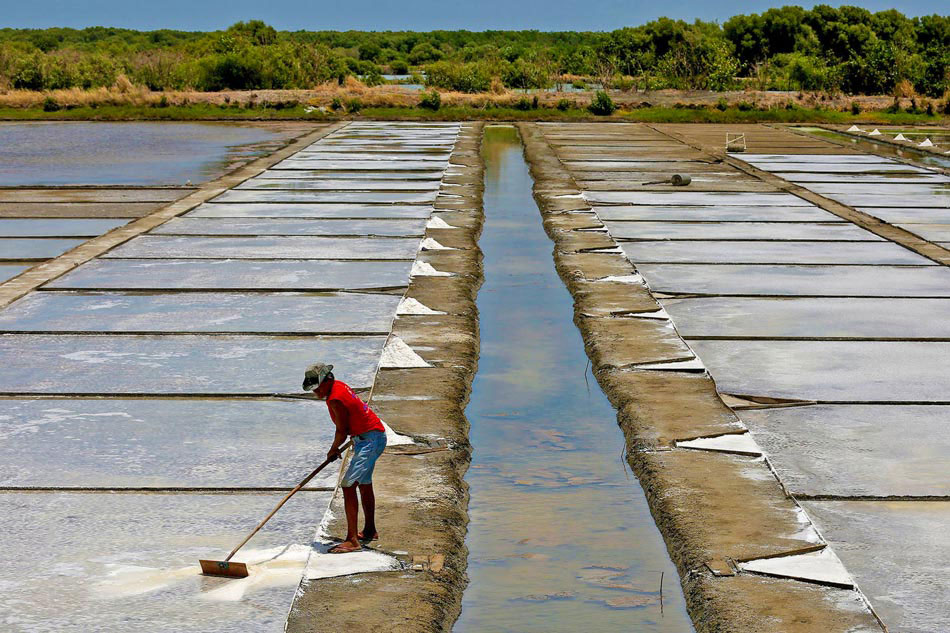Lack of capital bedevils Philippines' salt farmers | ABS-CBN
ADVERTISEMENT

Welcome, Kapamilya! We use cookies to improve your browsing experience. Continuing to use this site means you agree to our use of cookies. Tell me more!
Lack of capital bedevils Philippines' salt farmers
Lack of capital bedevils Philippines' salt farmers
David Dizon,
ABS-CBN News
Published Jan 23, 2023 11:05 AM PHT
|
Updated Jan 24, 2023 07:51 PM PHT
Lack of funding has proven to be a challenge to salt farmers in Bolinao, Pangasinan, according to one of them, forcing some salt farms in the country's salt capital to stop operations.
Lack of funding has proven to be a challenge to salt farmers in Bolinao, Pangasinan, according to one of them, forcing some salt farms in the country's salt capital to stop operations.
Jun Camero, a third generation employee of a 60-year-old salt farm in Bolinao, said Monday that no new salt farms have opened in the area due to difficulties in securing a permit, environmental compliance certificate (ECC) and other relevant documents.
Jun Camero, a third generation employee of a 60-year-old salt farm in Bolinao, said Monday that no new salt farms have opened in the area due to difficulties in securing a permit, environmental compliance certificate (ECC) and other relevant documents.
"Ang pagkakaalam ko sa Bolinao, same pa din, hindi naman nababawasan (ang asinan). Ang nagiging dahilan lang po, kinulang ng capital kaya hindi na nag o-operate," he said in a TeleRadyo interview.
"Ang pagkakaalam ko sa Bolinao, same pa din, hindi naman nababawasan (ang asinan). Ang nagiging dahilan lang po, kinulang ng capital kaya hindi na nag o-operate," he said in a TeleRadyo interview.
(To my knowledge, we have the same number of salt farms in Bolinao. It's just that some no longer operate due to lack of capital.)
(To my knowledge, we have the same number of salt farms in Bolinao. It's just that some no longer operate due to lack of capital.)
ADVERTISEMENT
Camero urged the government to provide three things: financial assistance, training and ease in securing ECCs in order to boost the salt industry.
Camero urged the government to provide three things: financial assistance, training and ease in securing ECCs in order to boost the salt industry.
He said the Philippines has huge potential to make more salt farms with its 36,000-kilometer shoreline, the fifth longest in the world.
He said the Philippines has huge potential to make more salt farms with its 36,000-kilometer shoreline, the fifth longest in the world.
Recently, two senators criticized the 27-year-old Salt Iodization law for the alleged deterioration of the Philippines' salt industry. The salt iodization law mandates the addition of iodine to salt to eliminate iodine deficiency disorders in the country.
Recently, two senators criticized the 27-year-old Salt Iodization law for the alleged deterioration of the Philippines' salt industry. The salt iodization law mandates the addition of iodine to salt to eliminate iodine deficiency disorders in the country.
Sen. Cynthia Villar said the law became a deterrent in the development of the local salt industry after it neglected to develop new areas and invite new investors. "It made all salt food grade. In 2021, it was reported that we only produced 7 percent of our salt requirements and imported 93 percent or 550,000 metric tons," she said last week.
Sen. Cynthia Villar said the law became a deterrent in the development of the local salt industry after it neglected to develop new areas and invite new investors. "It made all salt food grade. In 2021, it was reported that we only produced 7 percent of our salt requirements and imported 93 percent or 550,000 metric tons," she said last week.
Last year, Gerard Khonghun, Philippine Association of Salt Industry Networks president, blamed land conversion for the decline of the industry. He said salt farms in Cavite, Las Piñas and Parañaque have been converted into residential, commercial, and industrial areas.
Last year, Gerard Khonghun, Philippine Association of Salt Industry Networks president, blamed land conversion for the decline of the industry. He said salt farms in Cavite, Las Piñas and Parañaque have been converted into residential, commercial, and industrial areas.
ADVERTISEMENT
“These were now being converted without replenishing, without opening up new areas, without approving new areas for salt-making,” Khonghun said during a House Committee on Agriculture and Food deliberation on House Bill 1976 last October.
“These were now being converted without replenishing, without opening up new areas, without approving new areas for salt-making,” Khonghun said during a House Committee on Agriculture and Food deliberation on House Bill 1976 last October.
He said the Philippines only produces 60,000 metric tons of salt which supplies just 9 percent of the country's needs. Current consumption at the time meanwhile is at 600,000 to 683,000 annually.
He said the Philippines only produces 60,000 metric tons of salt which supplies just 9 percent of the country's needs. Current consumption at the time meanwhile is at 600,000 to 683,000 annually.
The Philippines needs to create about 18,000 hectares of new salt farms in order to meet the growing demand, the group said at the time. By 2030, the country needs about 1 million tons of salt a year.
The Philippines needs to create about 18,000 hectares of new salt farms in order to meet the growing demand, the group said at the time. By 2030, the country needs about 1 million tons of salt a year.
Khonghun had lamented that due to the low production rate, imports have been steadily growing over the years. By 2030, salt importation could reach 1.3 million tons or 96 percent of the total supply, he said. - With a report from RG Cruz, ABS-CBN News
Khonghun had lamented that due to the low production rate, imports have been steadily growing over the years. By 2030, salt importation could reach 1.3 million tons or 96 percent of the total supply, he said. - With a report from RG Cruz, ABS-CBN News
ADVERTISEMENT
ADVERTISEMENT



